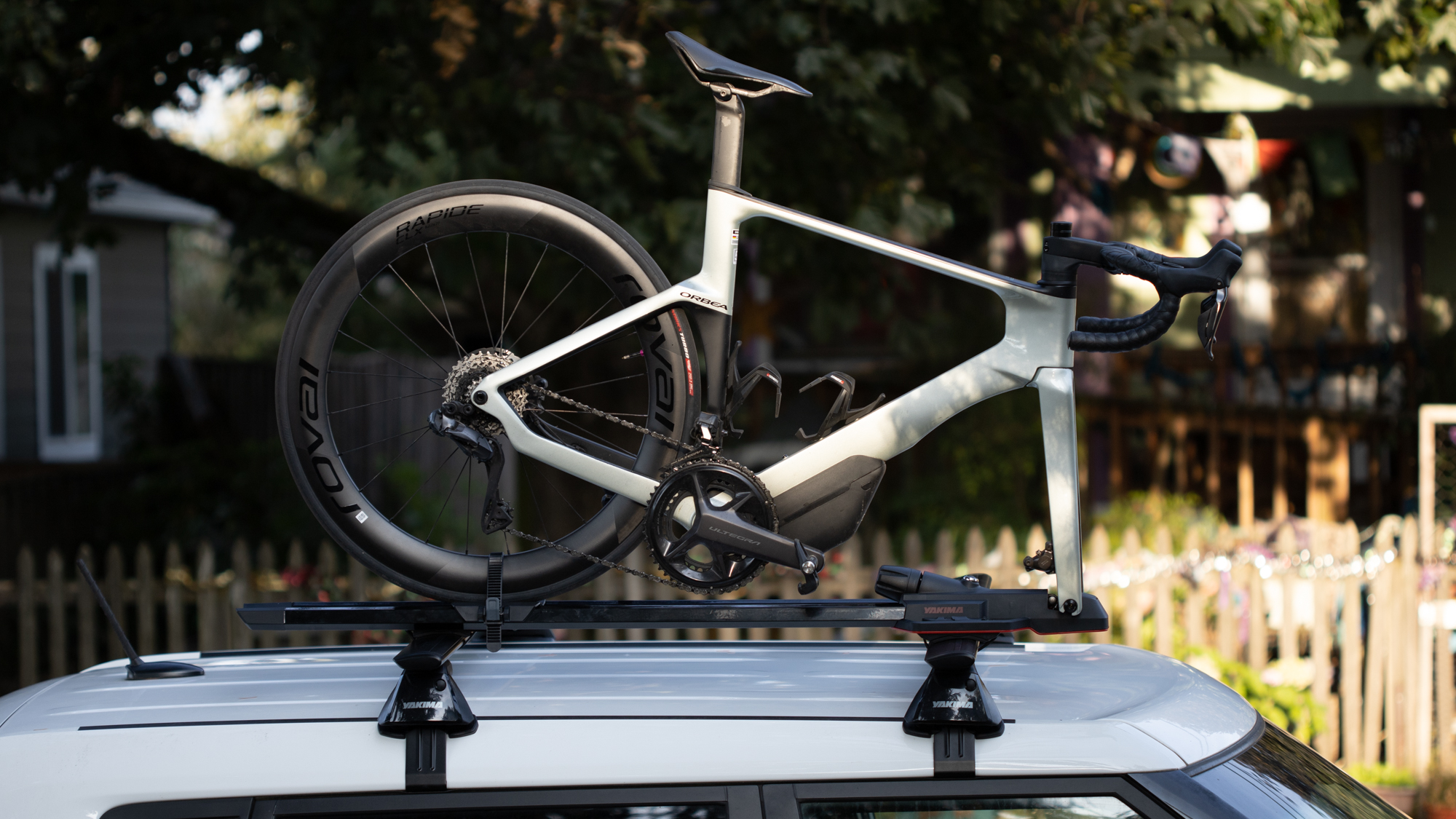Roof racks offer more storage capacity, while hitch racks are easier to load and unload bikes from. When considering whether to use a roof rack or hitch rack for transporting bikes, it ultimately comes down to personal preference and specific needs.
If you’re an avid cyclist who likes to take long road trips, you may need a roof rack to store additional gear such as camping equipment or luggage. On the other hand, if you frequently transport your bike in the city, you may prefer a hitch rack for its ease of use and quick installation.
Ultimately, your decision will depend on your needs, budget, and lifestyle. In this article, we’ll explore the pros and cons of both roof racks and hitch racks to help you make an informed decision.

Credit: www.cyclingnews.com
Roof Rack For Bikes
Definition And Explanation Of Roof Rack For Bikes
A roof rack for bikes is an outdoor accessory that is mounted on the roof of a car or suv to transport bicycles. It ensures you carry your bicycle outside of your vehicle and saves space inside your car. Primarily built for transporting bikes, a roof rack comes in various designs and styles and can carry different types of bicycles.
Pros And Cons Of Using A Roof Rack
Using a roof rack has advantages and disadvantages; here are some points to note:
Pros
- It is effortless to install and remove.
- It doesn’t affect the gas mileage of your car.
- The bike is entirely out of the way, so you have full access to your trunk.
Cons
- It can be challenging to load bikes, especially for taller vehicles.
- Your bike is exposed to the elements.
- A roof rack can add significant height to your car, making it difficult to access low-clearance parking lots.
Factors To Consider When Using A Roof Rack For Bikes
Before using a roof rack to transport your bikes, consider these essential factors:
1. The Type Of Car You Have
Ensure your car model is compatible with the roof rack you plan to purchase.
2. Number Of Bikes
Know the number of bikes you want to transport and choose a roof rack capable of carrying them.
3. The Weight Of The Bikes
Consider the weight of your bike and ensure the roof rack’s weight capacity meets it.
4. Wind Resistance
High roof-mounted racks increase wind resistance which, in turn, affects your car’s gas mileage.
Safety Precautions While Using A Roof Rack For Bikes
Adhering to safety measures ensures your bikes are secure and do not fall off while in transit.
1. Proper Installation
Ensure proper installation of the roof rack and bike carrier so that it’s firmly attached to the roof of the car.
2. Tie-Downs For Bikes
Use tie-downs to secure the bikes to the rack, and ensure the front wheel is securely attached.
3. Checking Clearance
Be cautious of low-clearance areas and check for overhead clearance before entering a garage or drive-thru.
4. Beware Of Bike Security
Secure all bike locks and take all necessary measures to prevent theft.
Now that you are aware of the pros and cons of using a roof rack, essential factors to consider before using one, and safety precautions to follow. Choose the best method that suits your needs and enjoy your biking experience!
Hitch Rack For Bikes
Roof rack or hitch rack for bikes: hitch rack for bikes
When it comes to transporting bikes, a hitch rack is a popular alternative to a roof rack. A hitch rack attaches to the vehicle’s trailer hitch and can hold one or multiple bikes. Here are some essential points to consider if you are planning to use a hitch rack for bikes.
Definition And Explanation Of Hitch Rack For Bikes
A hitch rack is a carrier that mounts onto a hitch receiver on your vehicle’s backside. A hitch rack for bikes is a fantastic option for those who don’t wish to mess with roof racks or heavy lifting loading bikes on top of their car.
Pros And Cons Of Using A Hitch Rack
Like every transport method, hitch racks for bikes come with their advantages and disadvantages. Here are some of the pros and cons of using this method:
Pros:
- Easy to load and unload the bike(s) onto the rack;
- Hitch racks do not block the driver’s vision while driving;
- They are robust and sturdy with well-designed locking mechanisms;
Cons:
- Hitches may reduce ground clearance;
- Hitch racks are more prone to accidents than roof racks;
- Hitch racks add length to the vehicle, which may be tricky to handle in small parking spaces.
Factors To Consider When Using A Hitch Rack For Bikes
If you decide to go with a hitch rack for bikes, you must consider the following factors:
- The size and type of your vehicle’s hitch receiver;
- The number and weight of bikes you wish to transport.
- Bike frame compatibility
- Rack stability
Safety Precautions While Using A Hitch Rack For Bikes
When using a hitch rack for bikes, observe the following safety precautions:
- Make sure that the bikes are securely strapped to the carrier and do not wobble.
- Avoid exceeding the recommended weight capacity of the hitch rack
- Tighten the rack to the hitch receiver and check it for any looseness
- Make sure the indicators, brake lights, and license plate are visible after mounting the bicycles on the rack.
By understanding these key points about using a hitch rack for bikes, you will be able to make a well-informed decision that will make your biking transport easier and safer.
Comparison: Roof Rack Vs Hitch Rack For Bikes
Roof Rack Or Hitch Rack For Bikes
Are you planning a biking adventure but not sure which rack to use? There are two popular options available: roof rack and hitch rack. Both have their pros and cons, and each is suitable for different situations. Whether you’re looking for a rack to hold one or a few bikes, here’s a comprehensive comparison of roof rack vs hitch rack for bikes.
Detailed Comparison Of Roof Rack And Hitch Rack For Bikes
A roof rack is located on top of your car and can carry bikes, kayaks, and other bulky items. A hitch rack, on the other hand, is mounted on the rear of your car and is designed to carry bikes only.
Here are some comparisons to help you decide:
- Ease of loading: Hitch racks are easier to load and unload your bikes since they’re closer to the ground. Roof racks need you to lift your bike onto the roof, making it more difficult to load and unload, particularly if you’re doing it frequently.
- Cost: Hitch racks are generally less expensive than roof racks, however, there are some high-end hitch racks that might cost you as much as a budget-friendly roof rack. You also have to factor in any necessary hitch mounts, adapters and the cost of installation.
- Wind resistance: Roof racks are known to impact fuel mileage and performance due to wind resistance, whereas hitch racks don’t cause such an impact. It’s important to note that some roof racks are designed with aerodynamics in mind, which reduces wind noise and drag.
Which Type May Be More Suitable For Certain Situations
When choosing between roof and hitch racks, it’s essential to identify what suits your biking requirements. Here are some examples where each rack is more convenient:
- Roof rack: If you’re carrying additional bulky items, such as kayaks, roof racks will provide you with the flexibility of transporting everything. They could also be more convenient if you’re carrying several bikes and need more space on the back of your vehicle for passengers or additional gear.
- Hitch rack: If you’re mostly transporting only bikes and not much additional gear, hitch racks will save you from lifting your bike onto the roof. They’re more suitable for mountain bikes, particularly those with wider frames and older bikes where the top frame bar is missing or the bike doesn’t have a straight top frame bar.
How To Choose The Right Rack For Your Biking Needs
Now that you know the differences between roof and hitch racks, here are some factors to consider while choosing the right one:
- Budget: If you’re on a tight budget, a budget-friendly hitch rack could be an excellent option.
- Ease of use: If you’re looking for ease of use, particularly if you’re frequently loading and unloading your bikes, hitch racks are easier to use than roof racks.
- Number of bikes: If you’re carrying several bikes, a roof rack may be more convenient. However, you need to factor in the additional installation cost and wind resistance.
- Additional gear: If you’re carrying additional gear along with your bikes, a roof rack is more beneficial as they provide additional space to transport them comfortably.
Seo-Friendly Subheading Summarizing The Comparison
Choosing the perfect bike rack depends on personal preferences and biking requirements. While hitch racks are easy to use and cost-effective, roof racks provide better flexibility and additional space.
Remember to choose the right bike rack based on your budget, ease of use, number of bikes, and additional gear you’re carrying to make your biking adventure more enjoyable and effortless.
Frequently Asked Questions Of Roof Rack Or Hitch Rack For Bikes
Which Is Better, A Roof Rack Or Hitch Rack For Bikes?
It depends on your needs and preferences. Roof racks offer more flexibility and greater storage capacity, while hitch racks are easier to install and provide better ground clearance.
How Do I Determine If My Car Can Handle A Roof Rack Or Hitch Rack For Bikes?
Check your car’s weight capacity and consult the manufacturer’s guidelines to ensure you’re within the limits. Consider the bike’s weight and the number of bikes you plan to transport.
Can I Use A Roof Rack Or Hitch Rack For Bikes With Any Type Of Bike?
Most roof racks and hitch racks are compatible with most types of bikes, but it’s important to check the weight limit and compatibility with any bike accessories you have.
What Are Some Pros And Cons Of Using A Roof Rack Or Hitch Rack For Bikes?
Roof racks offer more storage space and greater flexibility, but can be difficult to load and may affect your car’s aerodynamics. Hitch racks are easier to install and provide better ground clearance, but can be heavy and may not fit all types of bikes.
Conclusion
After weighing the pros and cons of both roof racks and hitch racks for transporting bikes, it ultimately comes down to personal preference and individual circumstances. If you prioritize avoiding damage to your car’s roof and don’t mind the extra effort of lifting your bike higher, a roof rack may be the better option for you.
However, if you frequently drive on rough roads or have difficulty lifting heavy bikes, a hitch rack may provide more convenience and peace of mind. No matter which option you choose, it’s important to prioritize safety and ensure your rack and bike are securely fastened before hitting the road.
By doing so, you’ll be able to enjoy your biking adventures and make the most out of your equipment without any worries or mishaps. Happy cycling!
